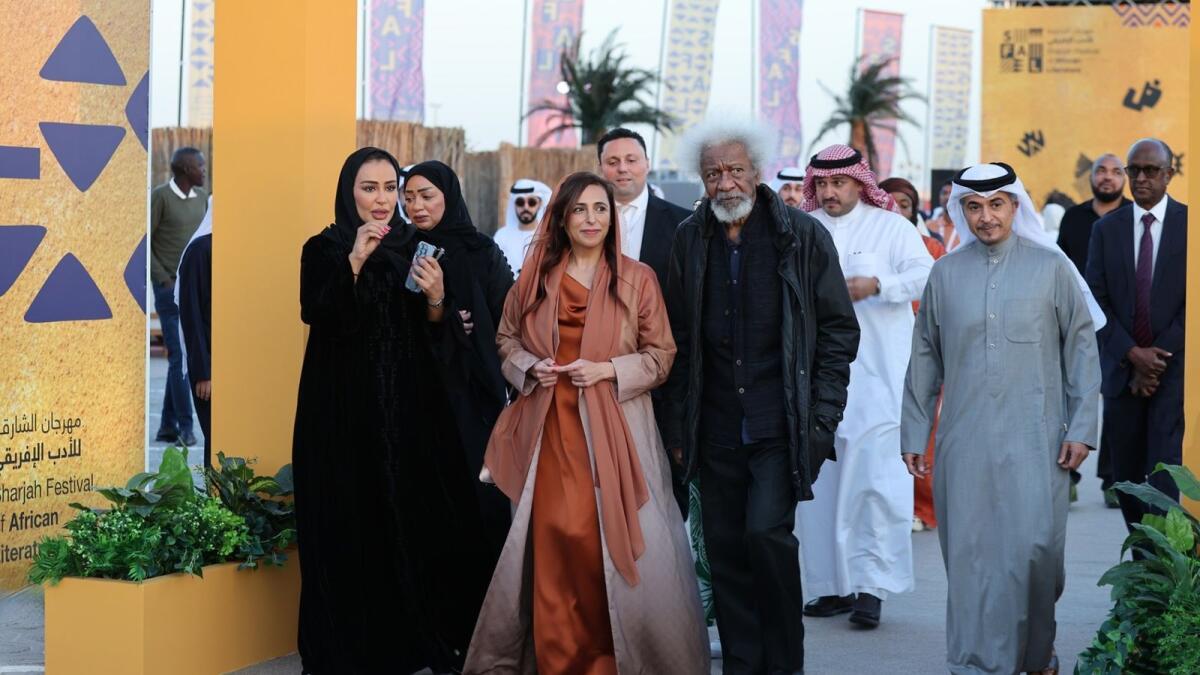
UAE: Meet Nobel Prize Winner Who Is Often Mistaken For Hollywood Actor Morgan Freeman
Soyinka, the first African to win the Nobel Prize in Literature in 1986, received the award from Sheikha Bodour bint Sultan Al Qasimi, on the sidelines of the first edition of the Sharjah Festival of African Literature (SFAL).
The 90-year-old Soyinka was recognised for his pioneering contributions to global literature and his commitment to social justice. He has crafted works that entwine African mythology with universal themes of freedom and equality. His contributions exemplify the power of literature to transcend boundaries and ignite transformation.
Stay up to date with the latest news. Follow KT on WhatsApp Channels.
During the Lifetime Achievement Award Speaker Series, the renowned author, poet, playwright, and activist shared profound insights from his illustrious seven-decade career in a conversation with host Layla Mohamed.
He shared deeply personal reflections on the multidimensional nature of African identity.“African identity is alive in our traditions, rooted in the rich tapestry of our people, and expressed through our art and storytelling,” he stated. He applauded the arts as a vessel for preserving African rootedness, emphasising that identity is a dynamic force shaped by language, history, and shared humanity.
In his session titled In the Light of the Word, Soyinka emphasised the intricate relationship between language and identity, describing language as“the essence of our being.” The Nobel laureate also reflected on the artistic process, noting how ordinary moments often inspire extraordinary creativity.“I once wrote a poem on a napkin in a restaurant," he reminisced,“inspired by the unspoken connection between two strangers. It's those fleeting, electric moments of humanity that compel me to write.”
Among the evening's highlights was Soyinka's reflection on the challenges of being a writer in the digital age. He humorously highlighted the pitfalls of modern technology, recounting how AI had recently been misused to mimic his voice as part of a scam.“It's horrifying to have your identity stolen in such a way, yet it underscores the importance of preserving authenticity in a world of increasing digital violations,” he remarked, before entertaining the audience with anecdotes about being mistaken often for Hollywood actor Morgan Freeman.
When speaking on his decades-long activism and writing, Soyinka affirmed their interconnectedness, stating,“Writing has always been a dialogue with my environment, a way of critiquing, elaborating, and sharing what I see, what I feel. Writing pays attention; activism breathes it into meaning.”
Festival-goers were especially inspired by Soyinka's discussion of his recent novel, Chronicles from the Land of the Happiest People on Earth, which marked his triumphant return to fiction after nearly five decades. He spoke candidly about the challenges and catharsis of returning to the medium, saying,“Only in prose could I capture the full breadth of humanity's kaleidoscope: the beauty and degradation I was witnessing. Theatre couldn't contain it all.”
'The Tale of Africa'
The four-day festival, held under the theme 'The Tale of Africa', brings together distinguished literary voices and creators, including Tanzanian author Abdulrazak Gurnah and 29 prominent guests from the UAE and 10 African nations.
The programme features eight panel discussions, three seminars, and 12 children's workshops, which focus on African heritage through engaging activities such as pottery-making, jewellery design, and storytelling through illustrations.
SFAL presents an enriching line-up of African literary icons, including celebrated writers such as Nigerian authors Chika Unigwe and Nnedi Okorafor, Kenyan storyteller Mara Menzies, and Zimbabwean novelist Jennifer Makumbi.
Alongside robust literary discussions, attendees can indulge in four culinary sessions led by acclaimed chefs like Wana Udobang and Ozoz Sokoh, bringing to life the flavours of Africa.
A celebration of African heritageThe festival commenced with a captivating musical performance by the Al Multaqa Orchestra, masterfully blending the timeless traditions of Arabic melodies with African-inspired rhythms. This was accompanied by an inspiring performance from an African dance troupe whose choreography, enhanced by vibrant costumes, vividly reflected the spirit of Africa's diverse cultural traditions. These artistic collaborations presented a heartfelt portrayal of harmony and mutual respect between the Arab and African worlds.
The festival also features enchanting musical performances that weave together African and Arabic melodies, including a concert by South African vocalist Ann Masina. To further immerse attendees in African culture, roaming performances will bring lively energy to the festival experience, creating an atmosphere of joy, discovery, and connection.

Legal Disclaimer:
MENAFN provides the
information “as is” without warranty of any kind. We do not accept
any responsibility or liability for the accuracy, content, images,
videos, licenses, completeness, legality, or reliability of the information
contained in this article. If you have any complaints or copyright
issues related to this article, kindly contact the provider above.

















Comments
No comment